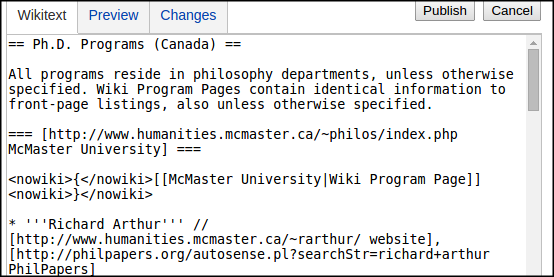This wiki provides an unranked list of Ph.D. and terminal M.A. programs that have strengths in philosophy of biology. Links are provided to the websites, CVs, and PhilPapers profiles of the relevant faculty at each program. Additionally, when known, the specialties and willingness of faculty members to work with new graduate students are noted. The primary intended audience is prospective or current graduate students with interests in philosophy of biology who want to get the lay of the land by seeing who works where, and on what.
The best way to keep up to date about everything that goes on here is by following us on Twitter. Changes to these pages can also be tracked via Atom feed.
Programs and Caveats
The Graduate ProgramsThe most up to date information is available at the links below. Information about the programs is also available as a PDF. |
Note to Prospective Graduate StudentsThe purpose of this wiki is to aid your search for philosophy of biology graduate programs that suit your tastes. It does so in two ways:
However, while this site may be where your research into programs starts, it decidedly should not be where it ends. You need to dig around and do your due diligence—e.g., contact people within the programs[1]—in order to put yourself in the best possible position to make an informed decision about where to apply. Best of luck! |
Browse Programs by Category
Below are two ways to browse programs by category. The first sorts all programs by number of philosophy of biology faculty. The second sorts U.S. programs by state.
You can find a listing of Australasian and Canadian programs by specialty on this page. Once that list includes programs from other parts of the world, they will be incorporated. As always, prospective students should fact-check the faculty numbers listed because academics change jobs frequently. (Note: 'P' stands for Page.)
| All Ph.D. Programs by Number of Faculty | U.S. Ph.D. Programs by State |
|---|---|
| |
|
Standards, Practices, and Guidelines
- The criterion for program inclusion is just that a philosophy (or HPS) program have at least one full-time faculty member who self-identifies as a philosopher of biology.
- The standard of evidence required to make the list is an official (or personal) university-affiliated website—or a publicly-accessible CV—that lists philosophy of biology as a primary research interest.
- Philosophers who have made contributions to the philosophy of biology but who do not list phil bio as an AOS/AOC are usually not listed.
- Affiliated, part-time, and emeritus faculty who work closely with graduate students should be labelled as such inside parentheses next to their names.
- Bioethics, environmental ethics, philosophy of neuroscience/cognitive science, philosophy of medicine, and history of biology—in and of themselves—are not counted as philosophy of biology.
A longer version of these guidelines is available.
How to Contribute
This is a wiki, so anyone can contribute. No account is needed—though you are encouraged to create one—and all changes can be rolled back, so edit with a free hand.
Making Edits
You can make edits in one of two ways: by clicking 'Edit', which enables WYSIWYG (or visual) editing, ala a wordprocessor, as seen here. Alternately, you can click 'Edit source', which allows you to edit the wiki markup in plaintext (as shown below). Use whichever method you prefer. Editing in visual mode is likely to be a little slower because the server has to translate wiki markup to html on the fly. So if things are too sluggish, you can switch over to 'Edit source'.
Wiki formatting/markup is very straightforward, and all you need to do is mimic the current entries since formatting is standardized.
If programs or faculty have been overlooked—which is assuredly the case—you are encouraged to add them, even if you are not a member of that department. Also, information will date rapidly, so by all means help keep things up to date.
Wiki Program Pages
Every program listed also has a separate Wiki Program Page where additional information can be provided to prospective students. While the style and format of this main page should be kept consistent, individual Wiki Program Pages can take any form whatsoever. To edit one of these pages, simply follow the Wiki Program Page link underneath the department listing of interest and edit that page.
The following programs have added considerably to their Wiki Program Pages. Feel free to mimic them.
- University of California, Davis
- University of Cincinnati
- University of Minnesota, Twin Cities
- University of Pennsylvania
Questions, comments, ideas? Let me know at shamiller@ucdavis.edu.
Notes
- ↑ This site is not in the business of giving prospective students advice—on how to select programs or anything else—but it can be very helpful and illuminating to contact graduate students currently enrolled in departments you are considering and asking if they would be willing to share their impressions of and experience in the programs. The worst that can happen is that they say 'no'. Of course, what they share must be taken with a grain of salt since everyone's experiences differ, and disgruntled students will paint a radically different picture than contented ones. For that reason, seeking out multiple sources can be worthwhile.
